

Connections - SCIS. Library flyer download. The future role of the teacher librarian. As the scope of information and technology continues to expand, Dr James Herring considers what impact this will have on the role of teacher librarians.
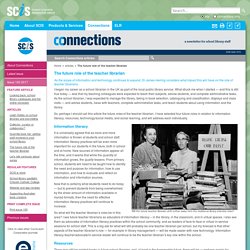
I began my career as a school librarian in the UK as part of the local public library service. What struck me when I started — and this is still true today — was that my teaching colleagues were expected to teach their subjects, advise students, and complete administrative tasks. As the school librarian, I was expected to manage the library, taking in book selection, cataloguing and classification, displays and class visits — and advise students, liaise with teachers, complete administrative tasks, and teach students about using information and the library.
So, perhaps I should call this article the future roles of the teacher librarian. I have selected four future roles in relation to information literacy, resources, technology/social media, and social learning, and will address each individually. Information literacy Resources. The importance of school libraries in the Google Age. Kay Oddone In Australia, access to the internet is almost ubiquitous.
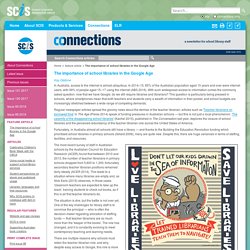
In 2014–15, 85% of the Australian population aged 15 years and over were internet users, with 99% of people aged 15–17 using the internet (ABS 2016). With such widespread access to information comes the commonly asked question: now that we have Google, do we still require libraries and librarians? This question is particularly being pressed in schools, where smartphones mean that both teachers and students carry a wealth of information in their pocket, and school budgets are increasingly stretched between a wide range of competing demands.
Regular newspaper articles spread the gloomy news about the demise of the teacher librarian; articles such as 'Teacher librarians on borrowed time' in The Age (Preiss 2014) speak of funding pressures in Australian schools — but this is not just a local phenomenon. The situation is dire, but the battle is not over yet. Scholastic's publication 'School Libraries Work! ' References. Professional learning - School libraries - guides at NSW Department of Education. It’s time: let’s improve schools' perceptions of teacher librarians. Bev Novak I recently noticed that a work colleague shared a link to Sally Dring’s fabulous article published in 2014, ‘Don’t overlook your school librarian, they’re the unsung heroes of literacy’.
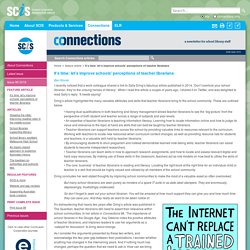
When I read this article a couple of years ago, I shared it on Twitter, and was delighted to read Sally’s reply: ‘It needs saying!’ Dring’s article highlighted the many valuable attributes and skills that teacher librarians bring to the school community. These are outlined below. What do TL do. Things that School Librarians Do. Awesome Graphic on the 27 Things Teacher Librarians Do. What librarians do.
The planner’s hat. A vision statement is just the beginning.
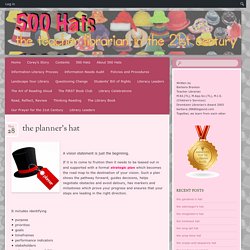
If it is to come to fruition then it needs to be teased out in and supported with a formal strategic plan which becomes the road map to the destination of your vision. Such a plan shows the pathway forward, guides decisions, helps negotiate obstacles and avoid detours, has markers and milestones which prove your progress and ensures that your steps are leading in the right direction. It includes identifying purposeprioritiesgoalstimeframesperformance indicatorsstakeholdersroles and responsibilitiesfinancial, human, time and physical resourcesexternal supportdocumentationreview periods It needs to answer these sorts of questions… What have we already got? Purpose. The reader leader’s hat. Being an “independent reader” is much more than the mastery of the mechanics – it involves having an emotional attachment that makes the experience a part of who we are as a person, embracing the affective domain as well as the cognitive and the physical.
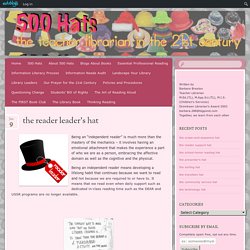
Being an independent reader means developing a lifelong habit that continues because we want to read and not because we are required to or have to. It means that we read even when daily support such as dedicated in-class reading time such as the DEAR and USSR programs are no longer available. In her book Reading in the Wild , a professional text that has had the greatest impact on my beliefs and actions of any I’ve read for a very long time, Donalyn Miller identifies five key characteristics of an independent reader… Read the research All should be on our professional reading lists. As well as formal research there are also some professional texts that should be a core element of your personal professional collection. Think like a reader.
Libraries for future learners-Conference 2015 pre-reading.pdf. School report. Curriculum Planning, Programming, Assessing & Reporting to parents K-12. Stocktake. State of the Library 2014-15. (4545 check outs this school year) Libraries are not the sum of their circulation statistics.
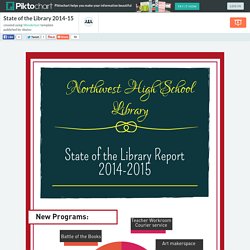
It's not the numbers that count, but the library can do on campus. It's more about relationships, collaboration, goals achieved Staff PD campus/district wide Research process with CORE CLASSES Booktalks for ENGLISH I-IV Curation tools with CTE CLASSES Community partnership with ROANOKE PUBLIC LIBRARY Create better presentations - WORLD LANGUAGES Infographics with CORE CLASSES Google Slides with ATHLETICS Video creation with FINE ARTS CLASSES Database and research with STEM CLASSES Professional Involvement/Activities: TCEA (member): Library/CIT partnerships Austin TX TxLA (member) Executive Board Member Austin, TX American Library Assn/YALSA Young Adult Lit Symposium Austin, TX North Texas Regional High School Librarians PLN (monthly) Northwest ISD District Library PLC (monthly)
Teacher Librarian Roles.